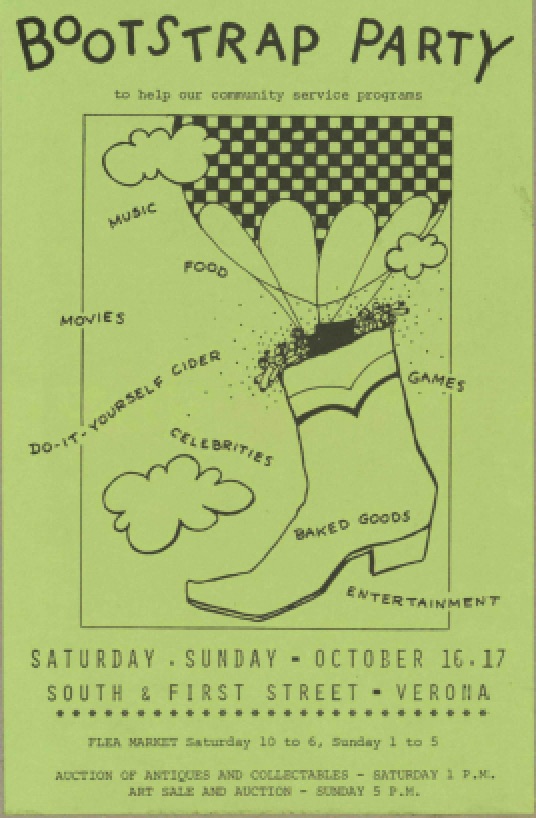Author: Cyd Johnson
Museum Studies Intern at Contemporary Craft - Fall 2017
Before starting my internship at Contemporary Craft I first watched a documentary, Tracing Outlines, and was immediately enchanted with its founder, Betty Raphael. How could I have lived in Pittsburgh my whole life and not have known about this awesome woman who started a modern art gallery downtown in the 1940s? After watching the documentary on Outlines gallery, I was excited to learn that at my internship I would be flipping through her large leather-bound scrapbooks and learn about other, somehow even more inspiring projects.
After Outlines Gallery closed in 1947, Betty Raphael got involved with the Riverview Community Action Corporation, a volunteer community service organization for the boroughs of Oakmont and Verona which provided used clothes to people in need, either giving the clothes away or selling them at a bargain price, but needed storage rooms for all the clothes they were receiving. Raphael reached out to a small craft store in Verona that was preparing to shut its doors, called “the Store for arts and crafts and people-made things.” She agreed to continue selling the works of local craftsmen in the Store if they could also use the space as storage for the clothing.
Shortly thereafter, a project grew out of the Store called the “Sociable Workshop.” The Store’s original director, Beth Cameron Walter, described it as a place “where professional artists and designers work with students, hobbyists, retirees and handicapped people in a non-profit program for the hand arts." They paid unemployed people to come to the workshop and take classes with professional designers and craftspeople. The objects made in the Sociable Workshop were sold in the Store, and two-thirds of the profits were given to their makers, while the other third went towards other community projects such as a bus that ran between the boroughs and helped transport people to/from the Workshop. (A bus system which, by the way, is still in place today).
The Sociable Workshop grew into a master-apprentice program, attracting nationally known craftspeople to come in and create easily reproducible designs for people with some technical skills, but who lacked creative ingenuity. The objects produced in the workshop began being noticed by retailers, first with a line of Santa Clauses sold in several New York department stores (including a window display at Cartier), and handmade objects being sold at Gimbels, a local department store. After seeing the displays, Park Smith called Betty Raphael and asked her to produce 800-1500 pillows/month for his stores. This led to the expansion of the Sociable Workshop into a new space, and the employment of nine weavers, four finishers, a manager, and two assistants. Despite Betty Raphael pouring her own money into it, the Sociable Workshop was always in debt. While they received some federal funding as an anti-poverty program, it was never enough. Raphael, with the help of the Riverview Community Action Corporation, decided that they had enough support within the community to fund-raise this and other community outreach projects. They hosted a Bootstraps Twin-Boroughs party to fundraise. Objects from the Store were sold at the fundraiser, and all the volunteer groups put their best foot forward in attempts to raise the money the government refused to give them. In the words of Betty Raphael herself, "Who can say how far a community or city neighborhood could go today toward 'taking care of its own' if the government would help rather than hinder their efforts?"
In scouring these news articles and advertisements beautifully arranged in her aging and delicate scrapbooks, a single quote from Pittsburgh Post-Gazette art critic, Donald Miller, properly summarized my findings: "No one has ever worked harder or more cleverly to promote crafts in Pittsburgh and Pennsylvania than Betty Raphael. She deserves more success." This got me thinking -if Betty Raphael couldn’t sustain this project, can anyone? And, are there any arts organizations, today, that are actively thinking about community outreach in such a powerful way? I figured talking with my co-workers at Contemporary Craft would be a good place to start since it is Betty Raphael’s remaining legacy.
The outreach coordinator informed me of programs they do a few times a year, as well as many connections they have in education with schools and museums. Contemporary Craft maintains its status as a non-profit, offering a free gallery space and programs that work in schools and with the women’s shelter in Pittsburgh. I understand that Betty Raphael struggled to secure funding in the 1970s, and I can’t imagine that getting government funding for a project of the magnitude of the Sociable Workshop would be any easier in 2017…
Is it still possible? I am now determined to find out.
Explore Cyd’s SCALAR storybook project here
Learn more about the Collecting Knowledge Pittsburgh initiative here










